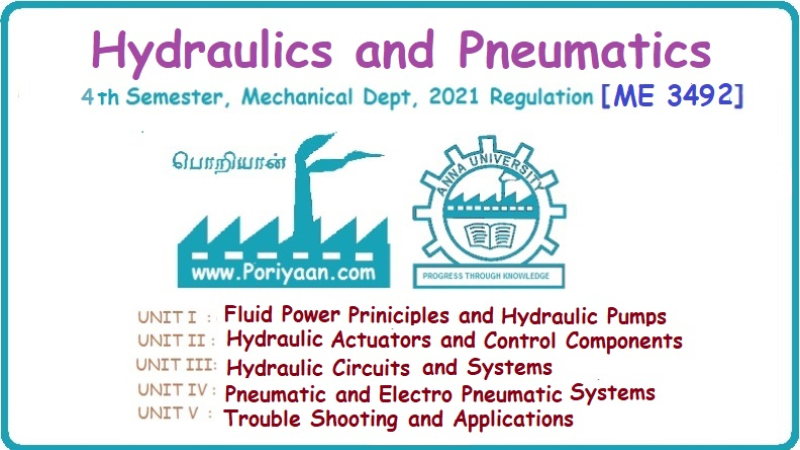Hydraulics and Pneumatics: Unit IV: Pneumatic and Electro Pneumatic Systems
Review and summary
Pneumatic and Electro Pneumatic Systems - Hydraulics and Pneumatics
In this chapter, the introductory concepts of the pneumatics have been presented.
REVIEW AND SUMMARY • In this chapter, the introductory concepts of the pneumatics have been presented. • The pneumatics may be defined as that branch of engineering-science which deals with the study of the behaviour and application of compressed air. • Pneumatic systems use pressurized gases as their medium to transmit and control power. • Air is popularly used as the fluid medium in almost all pneumatic systems, because air is safe, low-cost, and readily available fluid. • The advantages, disadvantages, applications, and selection of pneumatic systems have been described in this chapter. • Air is a mixture of gases containing about 78% nitrogen, 21% oxygen, and 1% other gases such as argon and carbon dioxide. • Absolute pressure = Gauge pressure + Atmospheric pressure. • The atmospheric pressure decreases with the increase in altitude. • Standard air is sea-level air having a temperature of 20 °C, pressure of 1.013 bar, and a relative humidity of 36%. • Perfect gas laws : • The basic components required for any pneumatic system are : 1. Air compressor, 2. Air tank, 3. Prime mover, 4. Air processing equipment (i) Air filters, (ii) Air pressure regulator, (iii) Air lubricator, (iv) Air dryer, and (v) Pneumatic silencer. 5. Control valves, 6. Pneumatic actuators, and 7. Piping. Pneumatics Pneumatic systems Air Atmospheric pressure Standard air Gas laws Boyle's law Charles' law Gas-Lussac's law General gas law Compressor Air tank Prime mover Fluid conditioners Filter Regulator Lubricator Air dryer Silencer Control valves Actuators Piping
KEY TERMS ONE SHOULD REMEMBER
Hydraulics and Pneumatics: Unit IV: Pneumatic and Electro Pneumatic Systems : Tag: : Pneumatic and Electro Pneumatic Systems - Hydraulics and Pneumatics - Review and summary
Related Topics
Related Subjects
Hydraulics and Pneumatics
ME3492 4th semester Mechanical Dept | 2021 Regulation | 4th Semester Mechanical Dept 2021 Regulation
